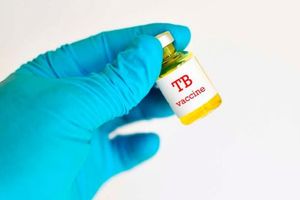More pain for TB patients as drug shortage persists

Stop TB Partnership Kenya Chief National Coordinator Evaline Kibuchi.She says that to deal with the shortage, the government has been redistributing TB drugs to facilities that are in dire need.
What you need to know:
- The National Tuberculosis, Leprosy and Lung Disease Programme is distributing a few packs for counties and patients are sharing packs while others have not yet started treatment.
- In normal situations, when a patient starts treatment, they are assigned a pack that is complete with treatment for the full course of six months.
Rose Otieno, a resident of Manyatta in Kisumu, is a distressed mother. Her 17-year-old son was diagnosed with tuberculosis in May. The boy is in pain and in dire need of TB medication. Rose collects her son’s TB medication at Jaramogi Oginga Odinga Teaching and Referral Hospital in Kisumu.
But due to inconsistency in supply, it has been two days since she got the drugs.
“There are no drugs at the facility. I have made many trips to the hospital but there are no drugs for almost a week now. My son has been on medication and was doing well until August when hospitals started experiencing a shortage of TB drugs. The last time we got his medicine was in September,” said the mother of four.
Elizabeth Odhiambo, another caregiver, is facing a similar problem.
She recounts that patients who made visits to JOOTRH last week went back home without medications.
“We have had the shortage of the drugs in hospitals for three months now. I have witnessed patients coming for consultations at the Chest Infections department, but they can’t get access to medication,” said Elizabeth.
Reports indicate that TB patients are suffering in various regions countrywide due to an ongoing shortage of drugs.
In a phone interview, Kisumu County Director of Medical Services Fred Oluoch confirmed there is a shortage of TB drugs in the county.
“Yes, I am aware there’s a shortage of the drugs in our facility. But I wouldn’t want to comment on it further, “ said Mr Oluoch.
Stephen Shikoli, National Coordinator Network of TB Champions Kenya, noted that the issue with drug sensitive TB patient treatment packs is being experienced countrywide.
“With the shortages, patients are not assigned a pack so this means they are sharing with others. Therefore, they are forced to go back to hospitals frequently for their medication.”
According to sources, the National Tuberculosis, Leprosy and Lung Disease Programme is distributing a few packs for counties and patients are sharing packs while others have not yet started treatment.
In normal situations, when a patient starts treatment, they are assigned a pack that is complete with treatment for the full course of six months.
The stable patients go for refills every fortnight and check-ups during the first phase of treatment, which is two months, then once every month for the remaining four months, which is called the continuation phase.
The packs are stored at a health facility so when the patient goes to the hospital, they are given dosage either after every two weeks or on a monthly basis.
Mr Shikoli said the shortage has led to some clients not getting enough drugs since they have to receive them on ration.
“With the shortage, patients are not assigned a pack so this means they are sharing with others. When patients are given short TCA (to come again) like around five days, then the possibility of those patients not coming back is high,” he said.
Stop TB Partnership, an international NGO established to eliminate TB as a public health problem, noted that the countrywide shortage of TB drugs has been experienced for more than six months.
In a phone interview, Stop TB Partnership Kenya Chief National Coordinator Evaline Kibuchi disclosed that to deal with the shortage, the government has been redistributing the drugs to facilities that are in dire need of the drugs.
She said that in areas where facilities have extra boxes of the medication, they are re-dispersed to areas with high prevalence of TB cases.
“Just two weeks ago, the government procured about 7,000 boxes, which is a drop in the ocean. They promised to deliver a second batch by next week, which is approximately 28,000 boxes,” noted Ms Kibuchi.
She added: “To be on the safe side the government needs to have an adequate supply of drugs that should last for at least three months.”
The Kenya Medical Supplies Agency (Kemsa) is responsible for the procurement, storage, and distribution of drugs on behalf of the government.
Already, the agency has advertised a tender for TB drugs in the local dailies.
But when contacted, Kemsa officials declined to explain the reason for the shortage of TB drugs.
TB is spread through the air from one person to another. TB germs are passed through the air when someone who is sick with TB disease of the lungs or throat coughs, speaks, laughs, sings or sneezes. Anyone near a TB patient can breathe tuberculosis germs into their lungs.
Experts say the shortage of drugs is likely to reverse the gains made in the fight against the disease.
“Should a patient be initiated on treatment and they don’t have their supply of the drugs, they are likely to develop drug resistance, which can be very expensive to treat,” said Ms Kibuchi.
She noted that Kenya had made efforts to reduce new TB infections and mortality.
“If this drug shortage persists, then we are likely to lose the gains we have made as a country. Kenya is among seven countries that were able to meet the global target of reducing TB infections and mortality in 2020 and 2022,” she said.
Kenya was among the countries that took part in the UN TB high-level meeting in New York last month. “Leaders pledged to ensure patients get correct diagnosis, treatment and care. But barely months after meeting, we have started falling short of the commitments,” she said.
Kenya is on the list of the countries with a high TB burden globally and among the 30 countries that contribute to 80 per cent of the global TB burden.






